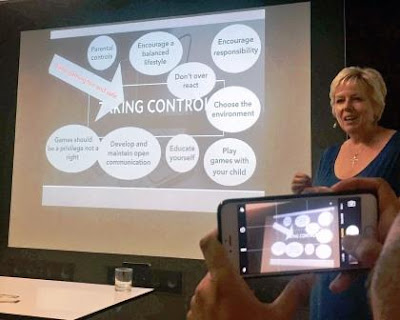Is gaming overtaking your child’s life, impacting sleep, health, relationships, academic experiences and general well-being?*
This Think Ahead information session is designed to help parents understand and discover the following:
• does your child have a serious gaming “problem”?
• why are games so compelling?
• how do games affect sleep, learning, memory, relationships and health?
• what games teach our children and games’ positive effects
• effective processes to help set limits around games
The topic is extremely relevant today, as our children do not grow up in the same world as we did! We now have to parent in a digital age, where we don't have the experience and know-how of growing up with digital devices and technology.
Pam Macmillan, currently Edtech coach at St Stithians Boys’ College and Greg Crighton, an educational psychologist with extensive experience in schools and private practice, gave some solid advice to parent with regards gaming and children. The "trick" is to be involved and to set up negotiated ground rules from a young age.
There are some negatives of gaming!
But the good far outweighs the bad!
Take control as a parent by sitting down with your child to discuss and negotiate time management. It boils down to having open conversations with your children. Take the time to "walk-through" the games (YouTube videos etc) and to play it with them. To use gaming as punishment (by taking it away), is not as effective as rather using it as a reward system: "The sooner your chores/homework are done, the sooner you can play and have a longer play time!"
It has been found that balanced children who play games, but also take part in other activities, such as sport and culture, are achieving better academically.
 |
| Pam Macmillan |
- Put parental controls in place
- Encourage a balanced lifestyle
- Games should be a privilege, not a right
- Develop and maintain open communication
- Don't over react
- Encourage responsibility
- Choose the environment
- Educate yourself
- Play games with your child
The positives far outweighs the negatives with regards gaming and children. As in everything else in life, we need balance! We can provide the balance as parents!
Some final notes: Visual learning is effective! Gamification of learning is important in the future! The brain selectively remembers, choosing the most stimulating moments of the day (memory and attention). To transfer the focal attention to the learning situation makes 100% sense. The learning outcomes are less important than the process. Pam Macmillan concluded to say that the benefits of learning with devices far outweighs the disadvantages!
*No, my child is not yet addicted to gaming, but I can start conversations with her about screen time, and balance in life! "Phew!"








